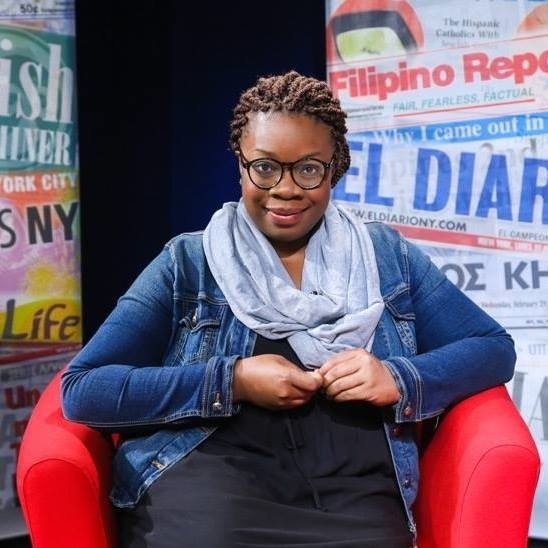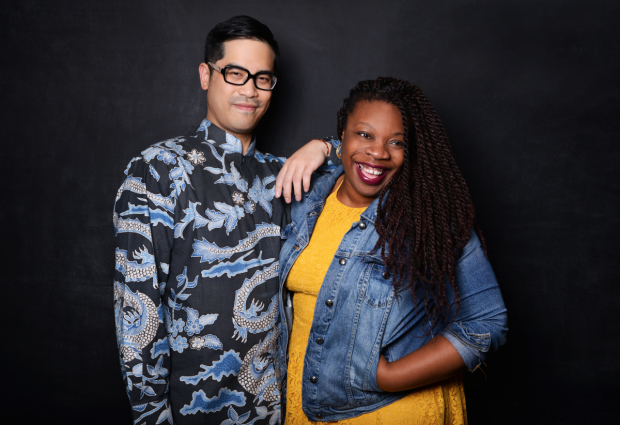The Origin Story of NYTW's Sojourners & Her Portmanteau
How Mfoniso Udofia turned a single play into an epic-length ennealogy.

(photo provided by New York Theatre Workshop)
The projected nine-play Ufot Family Cycle started out in 2009 as a single play, The Grove.
I wrote The Grove as a direct response to the representations of Africa I was seeing — and not seeing — on the American stage. I also wrote the play because I had so many questions to unpack: What does it mean to be a first-generation Nigerian in America? How does a communal society and tradition shred against a society that places the individual at its center? When do young people grow up and does it ever occur?
From this, came The Grove, a play that follows Adiagha Ufot, the first-generation offspring and eldest daughter of a transplanted Nigerian family. In this play Adiagha struggles to hold her Nigerian history within her American present.
Curiously, upon completion of The Grove, I found myself unsatisfied.
I was not unsatisfied with the play itself. The Grove was my monstrous, unwieldy, utterly lovable first child. I adored that play. However, I couldn’t shake the feeling that I was only telling a fraction of the life-arc of its characters. Plus, new unanswered questions kept circling in my head: Who were the parents of these first-generation offspring? How did these parents get to the United States, and did they like it there? How did their new home like them? What did they have to give up in order to make their new life? What did they gain?
Answering these questions yielded more plays and that original single play grew into a trilogy. The trilogy comprised Sojourners (the Ufot Family Origin Story), The Grove, and runboyrun. Sojourners excavates how Adiagha’s parents arrived in the United States and examines the triumphs and loses they endured upon leaving their homeland. Runboyrun examines the exact nature of the love between Adiagha’s parents, Abasiama and Disciple Ufot.
And of course, writing more plays opened the door for even more questions.
Soon that trilogy became a pentalogy, five plays including Her Portmanteau and In Old Age. Her Portmanteau, examines the complexity of motherhood and follows Abasiama as she reconnects with her children. In Old Age, considers how abuse can shape how one relates to both oneself and others and the play culminates with Abasiama finding true love.
A pentalogy will soon become an ennealogy, a set of nine plays that can be seen individually or together as a whole. In totality this cycle will follow Abasiama and Disciple Ufot and their children as they create a life in the States. It hopes to be a true immigrant creation story.
I have many close friends and colleagues who joke with me that this might end up being a 35-play cycle. I am confident that I am ending at nine plays as I have stuck to that magic number for the past two years. Plus, who wants to research the technical term for a 35-play series?
The creation of this cycle has not been a simple endeavor.
Lately I’ve been holding six various story lines in my head and attempting to track where and how those story lines converge and diverge. There are also strange moments where I’ve found myself editing two plays while generating another. The matrices and scaffolds for this cycle are complicated and nuanced. I’m striving to create nine plays that stand alone when seen separately, yet tell a greater story when told in pairs, trilogies or even — I cannot wait for this day — all together.
So, of course it makes sense that this work has now ended up at the New York Theatre Workshop.
NYTW is known for risky, genre-bending work. They are unafraid to run headlong into new terrain. And thus, they are the perfect playground for work such as this, and I am ecstatic and humbled to have plays from the Ufot cycle in their 2016-17 season.
Watching these plays go from page to stage at NYTW, while writing and editing the cycle has been thrilling. Sojourners has had two previous productions at equally risk-taking theaters, Playwrights Realm and San Francisco's Magic Theatre, and so I am able to relax a bit with this current NYTW production. Under the direction of Ed Iskandar, and along with the original off-Broadway design team and cast, we are working toward refining and polishing Sojourners. We’re striving to making sure that this third production truly realizes every moment.
Her Portmanteau is receiving its world premiere at NYTW, after having a workshop production at Dr. Barbara Ann Teer’s National Black Theatre. I am still shaping and molding this play, and NYTW has been incredibly supportive with providing me time to write, time to experiment, and resources that aid in manifesting the honest center of the play.
Alongside this production process, I am writing the sixth play in the cycle, Adia and Clora Snatch Joy. I am finding that the works feed each other. As Sojourners refines, so does Her Portmanteau. The creation of Adia and Clora Snatch Joy aids in the sharpening of both plays. It has been a wild ride and I hope you are able to catch these two chapters. Perhaps when you meet the Ufot Family, you too will wrestle with some of the questions I have been sitting with since 2009. It’s been a journey. I hope you will come along.

(© Jenny Anderson)









